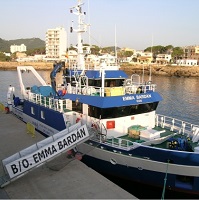Contact for the resource
MAGRAMA-SGM/ Directorate General of Fisheries Management - General Secretariate of the Sea
62 record(s)
Type of resources
Categories
Topics
INSPIRE themes
Keywords
Contact for the resource
Provided by
Years
Formats
Status
-

Estimation by pelagic trawling and acoustic methods of the biomass index and population and biological parameters of anchovy (Palinorus encrasicolus) and (Sardine pilchardus sardine as a secondary objective) to assess the state of the fisheries. In the pelagic trawling, the Daily Egg Production Method (MPDH) is applied as biomass estimation. Study of the influence of the hydrographic variables of the water column (temperature, salinity and chlorophyll).
-

Cartographic survey, obtaining seismic profiles and knowledge of the nature of the fund from high-resolution geophysical techniques (multi-beam and parametric probes) and the use of dredgers.
-

Obtain abundance indexes of lobster (Palinuros elephas) inside and outside the protected area of the Cala Ratjada Marine Reserve, carry out experimental plankton fisheries in order to obtain philosophical larvae of the different species of lobster present in the study area, and install and maintain lobster post-larval collectors in the coastal area (<25m) and deep (> 60m)
-

Study and mapping of the North Continental Platform of Morocco
-

Study and mapping of the Spanish continental shelf Canal de Menorca
-

Study of the characteristics and configuration of the existing seabed in the Columbretes Islands Marine Reserve and Sites of Community Importance (SCI) in its environment
-

Study and mapping of the Spanish continental shelf
-

Cartographic survey, obtaining seismic profiles and knowledge of the nature of the background from high-resolution geosysics techniques and dredgers.
-

Study of the anchovy biomass in the Bay of Biscay
-

Annual estimate of abundance of anchovy juveniles in the Bay of Biscay during the months of September and October
 Catálogo de datos del IEO
Catálogo de datos del IEO